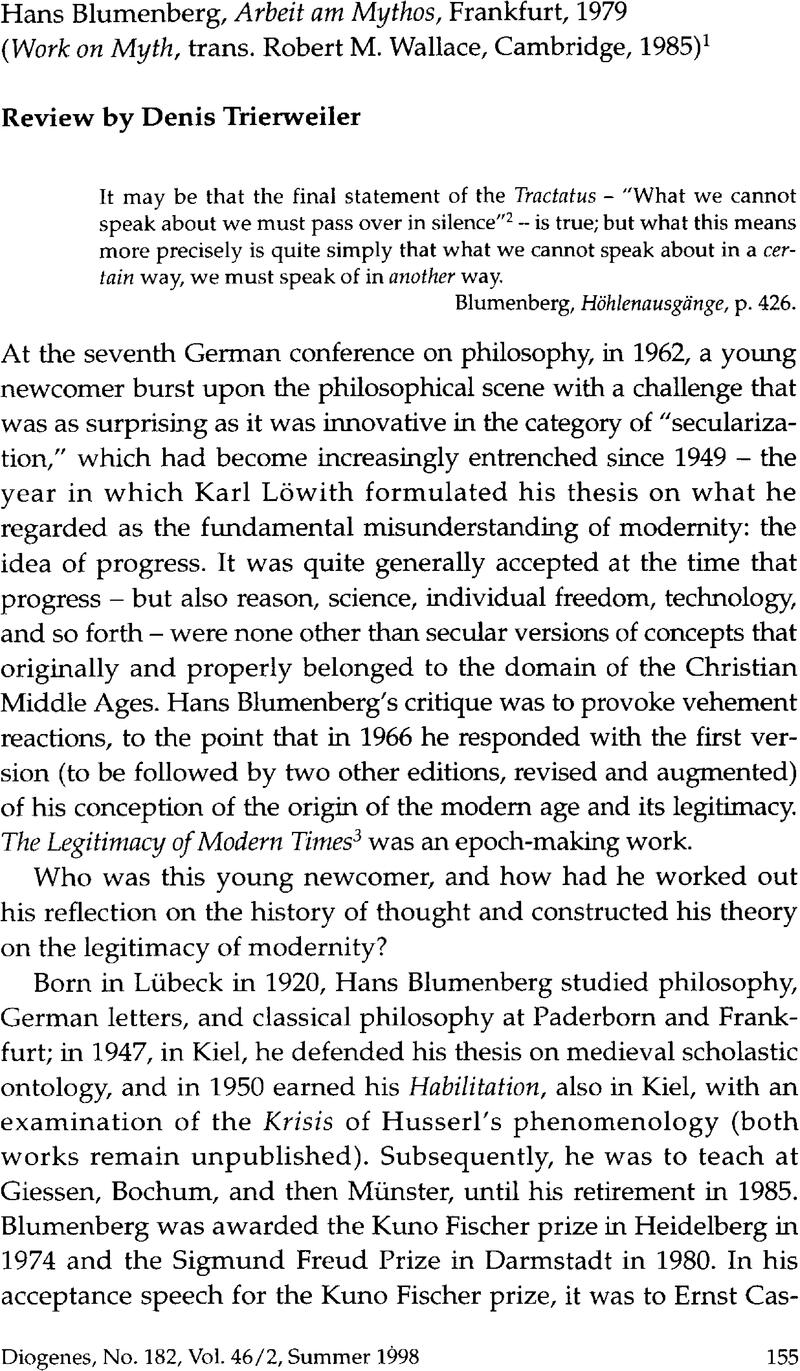Article contents
Hans Blumenberg, Arbeit am Mythos, Frankfurt, 1979 (Work on Myth, trans. Robert M. Wallace, Cambridge, 1985)1
Review products
Published online by Cambridge University Press: 28 February 2024
Abstract

- Type
- Book Review
- Information
- Copyright
- Copyright © 1998 Fédération Internationale des Sociétés de Philosophie / International Federation of Philosophical Societies (FISP)
References
Notes
1. Hereinafter cited parenthetically as WM, with page numbers referring to the English translation and the German edition, in that order.
2. Ludwig Wittgenstein, Tractatus Logico-Philosophicus, trans. D. F. Pears and B. F. McGuinness (London, 1961), par. 1, 7.
3. Exhaustively translated in the Anglophone, Hispanic, and Italian domains, Hans Blumenberg remains largely ignored, not to say unknown, in France, where the publisher Arche is to be saluted for being the only one to publish three of his texts in a French translation: (Le souci traverse le fleuve, trans. Octave Mannoni [1990]; Naufrage avec spectateur, trans. Laurent Cassagnau [1994]; and finally La passion selon saint Matthew, trans. Henri-Alexis Baatsch and Laurent Cassagnau [1996]). In late 1998 or early 1999, Gallimard will pub lish La légitimité des temps modernes, which was reviewed in 1995 by Rémi Brague for Le Débat (no. 83, pp. 173 ff.), which brought Blumenberg's work to the attention of a specialized audience. Les Editions du Cerf is preparing to publish La lisibilité du monde in a translation by Pierre Rusch.
4. One year after Blumenberg's death, two posthumous works were published: Die Vollzähligkeit der Sterne (The Fulfillment of the Stars), and “astronoetics,” by Surhkamp, and Ein mögliches Selbstverständnis (A Possible Self-Understanding), by Reklam, which is by no means autobiographical.
5. See Hans Blumenberg, Shipwreck with Spectator: Paradigm of a Metaphor for Existence, trans. Steven Rendall (Cambridge, Massachusetts, 1997), p. 93 (pp. 81 ff. “Prospect for a Theory of Nonconceptuality”).
6. Paradigmen zu einer Metaphorologie (Suhrkamp, 1960), p. 10.
7. Shipwreck with Spectator, p. 101.
8. Kant, Critique of the Faculty of Judgment (Critique de la faculté de juger, trans. J.-L. Delamarre [Pléiade, 1985], p. 1142).
9. Paradigmen, p. 11.
10. See Höhlenausgänge —Out of the Caves.
11. See Die Lesbarkeit der Welt - The Readability of the World (Frankfurt, 1981).
12. These spun out metaphors, which would hardly be to Blumenberg's taste, are borrowed from F. J. Wetz, Hans Blumenberg zur Einführung, a highly useful introduction which contains an exhaustive bibliography through 1993.
13. It would of course be necessary to elaborate extensively on the analysis of these two terms, which play a crucial role in this terrifying century in which we live and create (Yerushalmi, Zakhor). To my mind the first, which was of course a theme of Freud's, is untranslatable; the second is that of the chorus in Sophocles' Antigone, pollà tà deinà, “frightening things are many, but none is more frightening than man,” which Heidegger attempted to translate and interpret. I cannot develop these points here.
14. See Die Genesis der kopernikanischen Welt (The Genesis of the Copernican World), 3 vols. (Frankfurt, 1981).
15. See Mattäuspassion (The Passion According to Saint Matthew), op. cit., which is certainly Blumenberg's most personal book: what can the contemporary lis tener still perceive when he hears Bach's Passion? Does the disenchanted world in which the modern listener lives still allow him to understand this story, whose contents no longer belong to his frame of thought?
16. After Löwith, among others, and notably by Carl Schmitt: “All the pregnant concepts of the modern theory of the State are secularized theological con cepts.” Political Theology: Four Chapters on the Concept of Sovereignty, trans. George Schwab (Cambridge, Massachusetts, 1985). For a detailed examina tion of this category of secularization, the reader is referred to The Legitimacy of the Modern Age.
17. This is the Ungeheuere Spruch, which is usually translated as “unheard sen tence,” a phrase that, despite its neatness, leaves out the essential element: to wit, that Ungeheuer is the adjective Hölderlin had used to translate Sophocles deinós. Heidegger was to give the same adjective as a synonym for unheimlich in the 1942 seminar on Ister, to which only sporadic attention is paid, and which has not yet been translated into French (?). The adjective was also to become the center of the whole debate on nihilism between Heidegger and Junger in the 1950s. It is true that Carl Schmitt was to mock Heidegger sav agely in his journal, but without making any contribution to clarifying mat ters; see Glossarium, 5 March 1948: “Heidegger stoops to a platitude of consummate kitsch when he produces words like unheimlich as if he is squeezing lemons.”
18. See Hermann von Helmholtz, Über Goethes Naturwissenschaftliche Arbeiten, “Populaire wissenschaftliche Arbeiten,” vol. 1 (Braunschweig, 1865). On this point, see Loup Verlet, La malle de Newton (Gallimard, 1993), pp. 162 ff. and passim. See also Pierre Thuillier, “Goethe l'hérésiarque,” in La Recherche, no. 63 (1976), pp. 147-155.
19. “Nachdenklichkeit,” in Deutsche Akademie für Sprache und Dichtung (Heidel berg, 1980), pp. 57-61.
- 1
- Cited by




